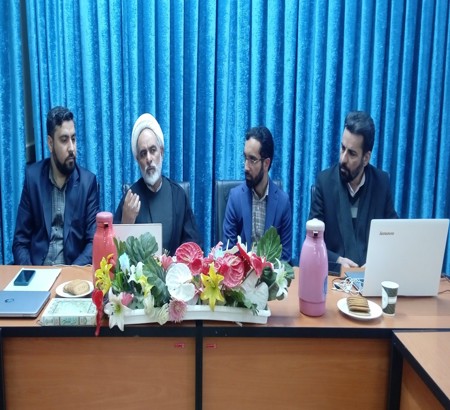

The first pre-conference session of the International Conference on "Resistance Theology" was held at the University of Religions and Denominations. The session, titled "Quranic Dimensions of Resistance Theology," was conducted in collaboration with the Faculty of Quran and Hadith at the University of Religions and Denominations on Sunday, February 4, 2024.
During the session, Dr. Javarshakian, Dean of the Faculty of Theology Faculty at Ferdowsi University and the scientific secretary of the conference, explained the philosophy behind organizing the international conference on resistance theology.
Following this, Hojatolislam Dr. Alavi Mehr, a professor at Al-Mustafa International University and head of its Syrian office, delivered a speech on the role of belief in divine lordship in shaping and consolidating resistance. He referred to Quranic verses to illustrate the role of divine lordship in resistance, noting that wherever resistance is mentioned in the Quran, divine support is also present. For example, in the verse "Our Lord, pour upon us patience and make firm our feet and give us victory over the disbelieving people," the consolidation of action is synonymous with making believers resistant, which is followed by divine support. Notably, these prayers begin with "Our Lord," highlighting the importance of divine lordship in relation to resistance. This is evident in contemporary times as well, where Lebanese resistance, relying on belief in divine lordship, has managed to withstand intense pressure from the Zionist regime.
Subsequently, Dr. Ali Abdollahzadeh, a member of the Faculty of Theology Faculty at Ferdowsi University, presented on the Quranic and narrative foundations of resistance nuclei. He discussed Imam Khomeini's views on the necessity of forming resistance nuclei and traced the concept back to the history of prophets in the Quran, referencing the companions of Noah, Abraham, Moses, the disciples of Jesus, and the companions of the Prophet Muhammad. He also outlined Quranic and narrative strategies for forming and strengthening resistance nuclei.
Finally, Dr. Purne'man, a member of the Faculty of Quran and Hadith at the University of Religions and Denominations, spoke on the Quranic themes of resistance theology. He noted that in a chaotic world filled with injustice, the question arises whether the only way for Muslims to live is through martyrdom operations or awaiting rewards in the afterlife. In such a context, resistance theology was introduced by the leaders of the revolution to find a religious and divine path for Muslims to live their faith and reduce human suffering in the face of oppressive forces. The best approach, he emphasized, is to use the Quran as the most reliable common document for the Islamic community, which all Islamic sects can utilize without division. To achieve this, one must focus on verses that convey eternal divine promises and solutions for saving the Islamic society, a method initially established by the founder of the Islamic Revolution and later elaborated by the Supreme Leader. This approach involves interpreting Quranic verses that have a permanent aspect and are not limited to specific times or events, conveying eternal divine promises. Ultimately, the key is to align oneself with divine laws and promises to achieve the desired outcome.





